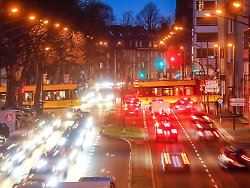Thursday, October 28, 2021
Car driver privileges in sight
Environment Agency delivers explosive proxy
The Federal Environment Agency presents a tantalizing list for the traffic light parties: Environmentally harmful subsidies of 65 billion euros could provide the money for the conversion of the economy to climate neutrality. Commuters, air travelers or farmers would lose their tax privileges.
The abolition of environmentally harmful subsidies in Germany could open up billions in financial leeway for more climate protection and social justice. This is the result of a study presented by the Federal Environment Agency (UBA) in Berlin. “We have to remove all brake pads that are hindering this transformation,” demanded UBA President Dirk Messner.
According to the study, there were environmentally harmful subsidies totaling at least 65.4 billion euros in Germany in 2018. Of this, 47 percent came from the transport sector, 39 percent from the energy sector, 9 percent from agriculture and forestry and around 5 percent from construction and housing. The actual volume is presumably even higher because the evaluation concentrated on the federal level.
Messner spoke of a strong contradiction: on the one hand, support measures for climate protection have been massively expanded in recent years, but at the same time politicians are sticking to subsidies that support old structures. Instead of reducing them, environmentally harmful subsidies have even increased since 2012. “It is paradoxical when the state promotes climate protection with many billions and at the same time subsidizes climate-damaging modes of production and behavior,” said Messner. “It doesn’t go together.” As an example, he cited “the nonsensical juxtaposition of the diesel privilege for combustion engines and purchase premiums for electric cars”.
On the test bench: diesel privilege, company car, commuter allowance
With a view to the expected traffic light coalition, a change of direction could at the same time counteract the problem that on the one hand there is a high need for investment in climate protection, but on the other hand higher taxes or additional debts should be avoided, continued Messner. With a view to the upcoming change of government, he spoke of a “window of opportunity”.
Specifically, the UBA experts insist on an end to the tax privileges for diesel fuel and a reduction in tax breaks for privately used company cars as well as the flat-rate travel allowance for commuters. All of this is not only harmful to the climate, but also antisocial, as recipients of high incomes benefit disproportionately from it.
According to the UBA, the tax reduction for agricultural diesel should also be omitted. In addition, the authority advocated taxing food made from animal products such as meat higher, while plant-based products should be taxed lower. In the construction sector, the existing funding should be more environmentally oriented through stricter environmental criteria. According to the UBA study, there are additional savings opportunities at European level in the case of tax breaks for kerosene, which are estimated at twelve billion euros, and for the VAT exemption for international flights.
“State should invest income in climate protection”
Messner emphasized that it was not about increasing government revenues. Rather, the money saved should be returned elsewhere or funding should be more climate-friendly and socially just. The aim is not to “rake in money for the federal government,” also clarified the lead author of the study, Andreas Burger.
Deutsche Umwelthilfe (DUH) has signaled its support for the UBA’s demands. Federal Managing Director Jürgen Resch spoke of a “litmus test for the credibility of the traffic light coalition in climate protection”. The pro-rail alliance called for the money saved to be used to strengthen environmentally friendly modes of transport, such as the railways. Greenpeace board member Martin Kaiser stated that the UBA report made it clear “that there is enough money – if it is used better”.
